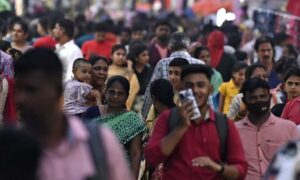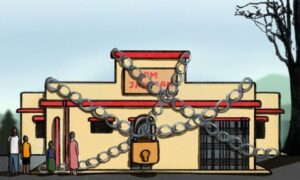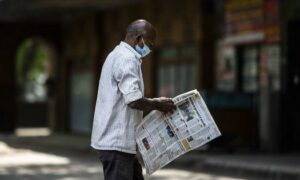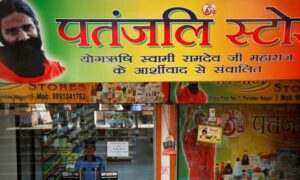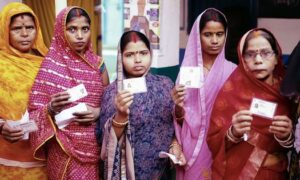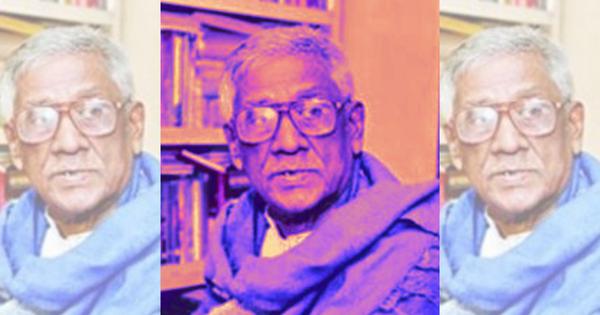
Abedali looked ahead as far as his eyes could see, but the road just seemed to go on and on. He had heard that if one went down this road, one would first pass Raghunathpur, and after that came Mathurapur, and then Mirganj. Once you went past these three large villages you reached the marketplace of Madarteker Haat, and after crossing that and advancing further there was the Baliyadangi police station. But what came after that?
He did not know. Because Ramjan Fakir, the shaman who attended to people and cattle, had only said so much; he hadn’t mentioned any place beyond. This was the last place he had spoken of sitting under the shade of the mango tree in the marketplace, spinning tales of his sorcerous prowess to the mischievous youths. Was there really nothing after that? And the road came to an end once it reached Baliyadangi! No settlements after that; no villages, no marketplaces – only vast crop fields, jungle, marshland and lakes.
Pohatu’s loving grandmother, who would sit in her courtyard after dusk telling stories to the hamlet’s little ones, had spoken of this road too. She had said that it was along this very path that Prince Young Flower had journeyed to reach Happyland.
But in her tale, there seemed to be no end to the prince’s travels. He kept venturing on and on, until at last, when he sat beneath a giant banyan tree to rest, he spotted a pair of magical birds. They told him about Princess Little Bud of Heartland, who was being held captive by the ogre Hankrai. Upon hearing this, Young Flower set off for Heartland, slew the ogre, and rescued the princess. But he hadn’t gone on foot – he had flown there on the back of a winged steed.
After hearing this tale from the old woman, the kids searched for the magical bird couple, but no one could find any trace of it. Abedali’s Ma said that the magical bird couple did really exist at one time. And the winged steed? When Abedali inquired about it, his Ma said that the winged steed too was around at one time. She pointed to the blue-coloured winged horse above the minaret of a mosque in the picture pasted on the fence of the house. After seeing that, Abedali couldn’t ask any more questions. Because, he reasoned, such a horse certainly existed somewhere, or else how could its picture have been created?
So, was what the old lady said true then? Abedali wondered as he walked alongside the sick bullock. He looked ahead. If one kept walking this road, and went far enough, one would eventually reach Happyland. Or so she had said. Everyone there was always in a happy state of mind. No one ever wept. People were happy when someone was born, and happy when someone died too. Because once they died, they went away to Heaven. There was no illness or sickness there, no poverty, no quarrels – there was no way anyone could be unhappy.
Abedali pondered as he went. Once he was grown up, he would walk down this road. If he could really reach Happyland, then…
Then what? Little Abedali’s mind could not go beyond, so he had to stop. After a while, he wondered if it wasn’t only a story, a tale to distract children, mere lies. If a country like that really existed, wouldn’t one have seen at least one person from there?
He then asked his father. “Baba, which village lies beyond Baliyadangi?”
Ahedali gave the bullock a shove. “Why, haven’t you heard?” he said, responding to the boy’s strange query. “Your Sona Fufu’s house lies beyond Baliyadangi. The name of the village is Khosholdangi.”
Abedali remembered. And that made him feel a bit foolish. The name of the village where his Fufu lived was not unknown to him, but it had never occurred to him that it was this road that led there.
His interest was stoked. “And which village lies after Khosholdangi?” he asked.
The little boy’s curiosity pleased Ahedali. “Why, have you forgotten everything? Tell me? After Khosholdangi there’s Dahuki, and then Koraliya, where the fair dedicated to Goddess Kali takes place. Beyond that lies the jetty on the Tangon River.”
“Is this the only road here?” Abedali’s juvenile mind wanted to get a clear idea.
“Yes, my son, there’s only this road here. It goes southwards towards the Haripur police station, and if you turn right here, you reach Nek Morod, that’s a pir’s majar – there’s a fair there every year in winter. If Allah wills it, I’ll take you to the fair, and your Ma as well. The Pir Baba here has miraculous powers.”
Abedali had heard about the fair in Nek Morod from Ramjan Fakir. He had mentioned other fairs too, but he never said where those were held, or how far away. He had only spoken of Nek Morod, narrated tales about the people at the fair, the splendour of the fair. Abedali’s curiosity was once again piqued. “Hey Baba, is that the only fair in these parts?” he asked. “The one in Nek Morod.”
“Why would there be only one fair? A big fair on the western side is Alowa Khowa; it runs for an entire month. And besides that, there’s the Khagrar fair further west. That’s a very big fair. Cows, buffaloes, goats, sheep, horses and elephants are all bought and sold there. One can’t say which all countries people come to the fair from. People with beards and caps come from Kabul, and Nepalis. Of course there are the Urdu speakers as well, and white-skinned sahebs come too.”
Abedali’s mind conjured up the unglimpsed fair, the one described by Ramjan Fakir. He couldn’t just see it, but could hear various sounds too. The uproar of countless folk, the sounds of whistles and flutes, of drums playing, and for that matter, he could even clearly hear the creak of the whirligig. He had heard tales about the circus at the fair. Apparently, there were fairies in the circus – they flew around in the air, and swung on swings. And there were tigers, most terrifying. They roared all day and night, and they said that the balls of menfolk dropped off in fear if they heard them roar at close quarters. The men then became impotent! But the man who tended to the tigers didn’t feel the least bit afraid. Rather, he lashed the tigers with his swishing whip. The tigers wailed with their tails between their legs. That was also because there were such bright lights all around the fair that the tigers couldn’t see anything. There were lights upon lights in the fair; there was no difference between day and night there.
He suddenly asked his father, “Hey Baba, have you seen the circus?”
“Why wouldn’t I have seen it?” Ahedali said, keen to prove to his son how experienced he was. “I’ve seen so many circuses, I can’t remember all of them! I remember seeing tigers and lions of course, and a couple of bears as well. The bears perform wonderful stunts. In one circus, elephants played football, and a young man rode a cycle with a single wheel and kept going round and round the arena.”
So immersed were father and son in their conversation that they nearly forgot about the sickly creature trailing beside them. Both returned to their senses when the bullock suddenly stumbled and fell, lying on its side with saliva oozing out of its mouth.
Something suddenly erupted within Ahedali’s chest. Would the bullock die on the road itself? Wouldn’t he even be able to take it to the kobiraj’s house?
He sat down, dejected, and began hitting his forehead with his palms. But not for long. His mind didn’t want to accept defeat. He rose and shook himself and got down to attending to the bullock. He soaked his gamchha in the drain by the road and wrung it a few times to give it some water to drink. “Kha bau, kone pani kha, tiyas khan mita pohile,” he said to the beast, as if he were caring for a family member, “drink, my dear, drink some water, quench your thirst first.”
Abedali noticed that his father wasn’t just speaking to the animal that lay sprawled on the ground in the manner a person spoke to a sick son or brother while nursing them, he was also patting its head and body.
“You’ll get well, dear,” Ahedali said. “I know you’ll be well as soon as you have the kobiraj’s medicine… You’re in a lot of pain, aren’t you? I was such a complete donkey to have hit you so much. Alas! Shoytan got into my head then, or else would I have done that? After all, anger is another name of the Devil. Get well, my dear, I’ll never hit you again.”
Abedali too felt a twinge of remorse. He shouldn’t have hit the bullock with the lath like he had. Following his father, he too sat down on the ground and began running his hand over it.
After lying still for a while, the bullock lifted its head slightly, as if it might try to stand. But it didn’t. After a moment’s pause, it lowered its head to the ground again.
But Ahedali hadn’t stopped speaking all manner of affectionate things. “O you helpless creature, how much you all suffer,” he rambled. “And yet people keep thrashing you. There’s no one crueller than man in this world. Just gather your strength now and rise.”
The animal lay on the ground as before, but it blinked now. It also moved its hind legs a few times. That gave Ahedali some hope. “There you are, my dear,” he said, “just stand now – Heave ho! Harder, pahalwan…” And as Ahedali said that, he pulled the rope around its neck.
Abedali too applied his meagre strength and pushed the rear of the animal as hard as he could. It seemed to be working. The bullock shifted its legs a few times, then slowly rose, tottering, and stood, still unsteady.
It didn’t wobble for long; soon it began to move forward, one step at a time. His father should have been pleased, but Abedali noticed a look of alarm on his face. He stood still, watching the uncertain movement of the bullock’s legs.
“Hey Baba,” he asked, “what are you looking at?”
Ahedali didn’t say anything, he merely shook his head. He then almost broke into a run, and grabbed the rope around the bullock’s neck. And then he said, “I think someone’s poisoned the bullock. Or else why would its legs move in opposite directions, like those of drunkards at the toddy shop?”
Hearing what his father said, Abedali too observed the creature carefully. Yes, his father’s guess was probably right. Had he not held on tightly to the rope, the bullock would have lost its footing on the slope of the road.
Excerpted with permission from The Struggle, Showkat Ali, translated from the Bengali by V Ramaswamy and Mohiuddin Jahangir, Speaking Tiger Books.
📰 Crime Today News is proudly sponsored by DRYFRUIT & CO – A Brand by eFabby Global LLC
Design & Developed by Yes Mom Hosting

